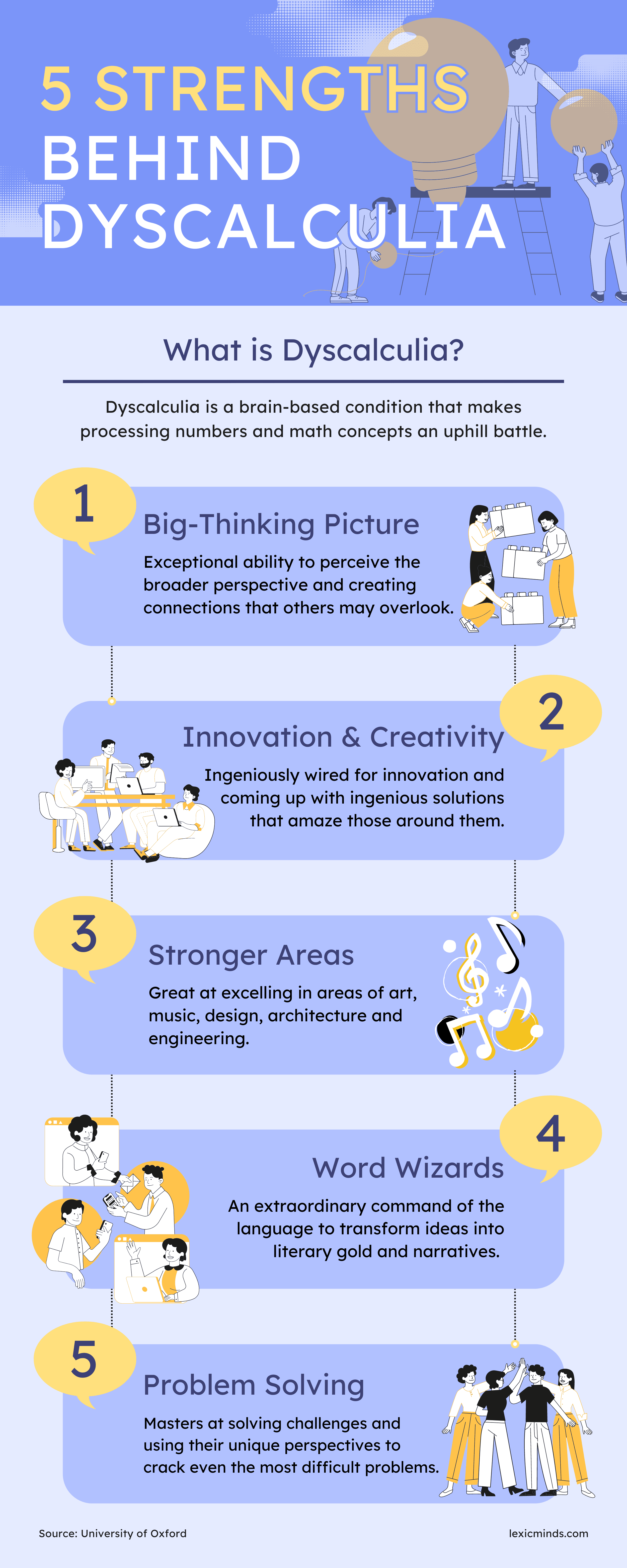Numbers. The great universal language, right? Being able to effortlessly read, write, and compute them comes naturally. Or so the story goesâŠ
What is Dyscalculia?
Dyscalculia is a brain-based condition that makes processing numbers and math concepts an uphill battle. It is the mathematical cousin of Dyslexia.
Chances are you are dyscalculic if you have struggled to grab basic arithmetic, remember those scary timetables, or pretty much could not do any math without wanting to cry.Â
Take a deep breath.Â
This learning difference is way more common and extraordinary than you think.
At its core, Dyscalculia involves difficulties with actions related to numbers, for example:
- The sense of numbers and basic calculations
- Mathematical reasoning
- Recalling math facts
- Telling the time
Dyscalculia originates from differences in how the brain processes numerical and math data. It exists on a large spectrum, with some people experiencing mild symptoms and others having a more pronounced condition.Â
It is extremely common for Dyscalculia to overlap with Dyslexia, the reading-based learning difference. Actually, many top experts believe the two are closely neurologically linked.Â
The Strengths Behind Dyscalculia
Let us shine a spotlight on the awesome features behind Dyscalculia. Welcome to how your mind works:
- Big-Picture Thinking: Dyscalculics are the masters of seeing the forest for the trees. Your minds excel at capturing the grand scheme of things, making connections others might miss, and coming up with abstract concepts that light up the room.
- Innovation and Creativity: Forget about boring old memorizationâdyscalculic brains are wired for innovation. You have an ease to approach problems with a fresh perspective, brewing up ingenious solutions that bedazzle everyone around you.
- Word Wizards: Some dyscalculics are extraordinary with words. For instance, your talent for language facilitates turning ideas into gold, whether you are captivating an audience with a speech or telling a story.
- Pattern Recognition: Numbers might not always be your best friend, but dyscalculics have a sixth sense of patterns. You are like detectives, spotting clues and cracking mysteries like pros.
- Master Problem-Solvers: Are you good with puzzles? It is not a coincidence. You thrive on challenges and use your unique perspective to crack even the toughest nuts.
- Determination and Resilience: Overcoming dyscalculia is not for the faint of heart. Dyscalculics like you embody resilience.
Dyscalculia can be a badge of honor. One that showcases a mind of strengths that set you apart. It is time to celebrate the incredible ways dyscalculics shape our world and redefine what it means to think differently.Â
Famous People with Dyscalculia
Dyscalculia is like a silent ninja who hides in plain sight, making it impossible to tell when a person may be struggling with numbers. But guess what? Some of the planet’s most brilliant, successful minds have shown symptoms of Dyscalculia:
- Albert Einstein: The most famous scientist of the 20th century once said, “Do not worry about your difficulties with Mathematics. I can assure you mine are still greater.” Many believed it was Einstein’s Dyscalculia that allowed him to revolutionize physics by seeing math differently.

- Robbie Williams: The iconic British singer, and interpreter of ‘Angel’, has Dyscalculia. Moreover, his brilliant mind has gotten him several #1 hits and awards such as 18 Brit Awards, the Outstanding Contribution to Music prize twice, an Icon Award for his lasting impact on British culture, eight German ECHO Awards, and three MTV European Music Awards.

- Cher: Ever heard of the interpreter of ‘Believe’? Yes! It is no surprise that two of the famous people on this list have succeeded in music, a field that required creativity and out-of-the-box thinking to stand out from the crowd. She is the only artist with a #1 single on a Billboard chart in each of the past six decades.Â

What is the takeaway here? Their stories serve as a means of hope. A reminder that a different relationship with numbers is just one chapter in a book with potential.Â
The Daily Life Struggles Behind Dyscalculia
For dyscalculics, numbers dance to their beat. Everyday tasks can feel like navigating a labyrinth with frustrations and obstacles other people do not think about.Â
Here are some daily life struggles behind Dyscalculia and how you can solve them:
â° Time-Telling Tango
Analog clocks? An enemy sometimes. Reading analog clocks and telling the relationships between the hour and the minute hands is a challenge. Reading the hour and minute hands can feel like cracking a secret code.Â
â Solution: Befriend the digital age with clocks that speak your language.
đ Calendar Drama
Days, dates, months. Oh my! Keeping track of dates, days, and months, and understanding patterns like  “every other Thursday” is really confusing.
â Solution: Use virtual friendly reminders from Siri, Alexa, or other assistants.
đ” Loose Change and Money Math
From pocket change to budgeting, anything involving cash is a game of chess.Â
â Solution: Use cash as little as possible and rely on cards and apps for transactions.
đ° Fraction Frustration
Cups, pints, and fractions, oh my! Visualizing measurements for a quotidian activity like cooking can feel like trying to solve a Rubik’s Cube blindfolded.Â
â Solution: Use tools with clear visuals and recipes written with amounts.
đ Directional Dilemmas
“Turn left at the big oak tree” Sounds simple, right? Wrong! Dyscalculics can feel like they are lost in between lefts and rights.Â
â Solution: Let your GPS be your trusty voice guide through the twists and turns of life’s road. Rely heavily on the graphic map.
đ§ Memory Meltdowns
Multiplication tables? Math formulas? Dyscalculics struggle to keep numbers and codes straight.Â
â Solution: Try utilizing apps and technology to solve your equations. Check out our resources here.
Daily Dyscalculia difficulties are extremely frustrating. Remember that there are always strategies to manage or work around them. How to make life smoother? Keep reading.Â
Supportive Strategies for Dyscalculics
Living with Dyscalculia is all about embracing your strengths and finding clever ways to remove those problematic math encounters. Here are some key strategies:
- Use technology and apps to your advantage: Tech to the rescue. There are calculator tools, financial apps, and other tech that cut out doing math. Employing technology will reduce frustration.Â
- Develop personalized learning tactics: Get creative with your studying approaches. Use color-coding, diagrams, and breaking concepts into smaller steps. Read more tips here.
- Engage those senses: Mix things up and color outside the lines. Listen to instructional videos or podcasts to remember numerical methods. The more senses you engage, the better.
- Exploit your verbal strengths: If numbers are not your best friends, let words talk. For example, discuss with teachers or employers to lean further into essays and papers over other test performances.
- Speak up for support: Do not be shy. Ask for extra time during tests or access to a trusty calculator. Set yourself up for success by requesting tools and resources.
- Find your people: Connect with Dyscalculia communities online and in person. Share tips and have each other’s back during frustrating moments.Â
In summary, the key is playing to your natural strengths as a dyscalculic while finding coping mechanisms that resonate for you personally. It is all about finding what works for you to make Dyscalculia manageable.
Points of Action
- Get comfortable with your numbers. Take a moment to understand and analyze your relationship with math to focus on strategies that work for you.Â
- Educate yourself. The more you learn about the science behind it, the more you will see Dyscalculia as a superpower.
- Connect with fellow dyscalculic people online. You are not alone in this journey.Â
- Advocate for your needs. Use accommodations at school, and approach teachers or employers about them to customize your experience.
Key Takeaways
- Dyscalculia is a different cognitive ability with brilliant strengths in reasoning, innovation, and conceptual thinking.Â
- Many of history’s creative minds like Einstein, Robbie Williams, and Cher are believed to be dyscalculic. Inspiring, right?
- Customizing learning tactics, using technology, and self-advocating are powerful strategies for dyscalculics to manage obstacles.
- Finally, we must reframe the narrative: dyscalculic minds are a benefit rather than a stop sign. Your strengths are brilliant.
At the end of the day, Dyscalculia is a unique way of processing information and our differences make us strong as humans. It can be an incredible advantage in today’s world where artificial intelligence has become an everyday thing and we need to showcase what makes us unique.Â
Owning and understanding your Dyscalculia is your empowerment.
Sources:Â
Dyscalculia | Equity and Diversity Unit by the University of Oxford
Dyscalculia (American Psychological Association)
How to teach math to students with dyscalculia
5 Historical Figures Who Overcame Learning Disorders
6 Famous People with Dyscalculia
Disclaimer: This is not medical advice. Please consult with a licensed professional when in doubt. Lexicminds is not liable for actions taken from this page.








